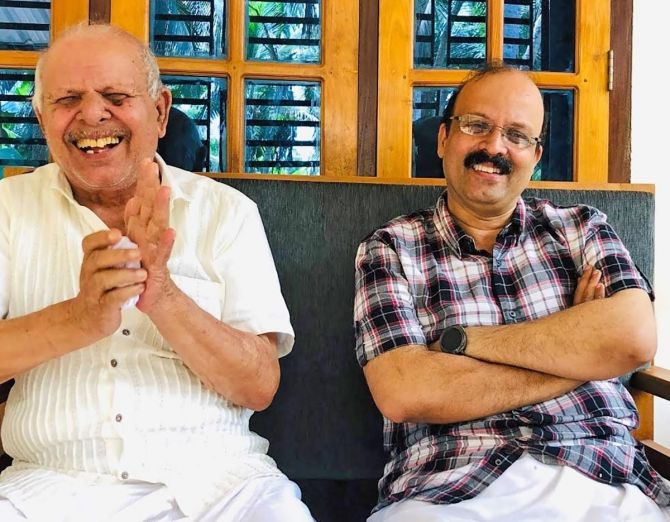'In a secular society where women are treated equally by law, I want the same equal status for my daughters in society, on par with all the boys.'

On October 6, 1994 under the Shariat law, C Shukkur, an advocate from Kanhangad in Kerala's Kasargod district married Dr Sheena, also a lawyer.
After 29 years of marriage, they decided to marry again -- to be precise to register their marriage -- on March 8, 2023. But this time under the Special Marriage Act.
Shukkur is a well-known advocate practising in Kanhangad while Dr Sheena is a professor of law at Kannur University.
They have three daughters; their eldest daughter Jasmine works as a law clerk with a Supreme Court judge.
What made the lawyer couple take the decision to marry again?
"When a Muslim woman is treated equally as a voter, it is not right to treat them differently when it comes to inheritance. That's the point I wanted to convey," C Shukkur tells Rediff.com's Shobha Warrier.
You decided to register your marriage under the Special Marriage Act after 29 years. What made you take such a decision?
Even when I was in school, I was concerned about the kind of inequality I witnessed in Kerala society.
But I experienced it first hand when our maternal grandmother passed away. She had two sons and one daughter who was my mother.
But my mother passed away even before our grandmother.
The ownership of the house we were born, grew up and lived till then, was in the names of both my grandmother and mother.
When my grandmother passed away, her share in the house went to her sons.
So, we had to pay the market price and buy her share from our uncles though we had been staying there all our lives.
I cannot criticise the stance taken by my uncles because they are entitled to the property legally.
They were just following what the Shariat inheritance law says.
Till then, I had only seen my clients in such helpless situations, when women were treated unfairly by the inheritance law.
When we had to face a similar situation, it made me think how unjust the law was.
You have three daughters. Do they do not get any inheritance from their parents under Shariat Law?
All the Muslims in India are governed by the Muslim Personal Law (Shariat) Application Act, 1937 which deals with marriage, succession, inheritance and charities among Muslims.
According to this law, the inheritance of Indian Muslims is under Muslim Personal Law or Shariat. However, there is no mention of Shariat in the 1937 Act.
Therefore, Indian courts take decisions on the Principles of Mahomedan Law written by Sir D H Mulla in 1906.
According to this law, daughters would get only two third share, and one third of the property will go to the brothers of their father or mother.
In our case, if both my wife and I were to die in an accident, one third of our share would go to my wife's brothers and my brothers.
How unfair and unjust the situation is!
On the other hand, even if you have a day old male child, the entire share would go to the siblings.
The discrimination in inheritance occurs when you don't have a male child.
Do we decide whether we are going to have a male child or a female child?
My thought was, why should our children face discrimination because they are girls?
Our children live in a secular country the law of which does not discriminate male and female.
They study, work and lead a life along with girls from other communities.
There are Hindus, Christians and atheists. When those girls are treated equally by law, our girls are treated unequally.
I feel this discrimination diminishes their status in society.

Would you say, it is not just a question of inheritance, but the general discrimination perpetuated by society?
Yes, it is not just a question of inheritance. I decided to bring this aspect, this kind of discrimination in front of our society, to the notice of people.
My brother has four sons and I have three daughters, but the law treats his sons and my daughters differently.
In a secular society where women are treated equally by law, I want the same equal status for my daughters in society, on par with all the boys.
They should not feel degraded or humiliated.
When according to Article 14 of the Constitution, irrespective of religion, caste or gender, all have equal rights, in our situation, we see gender discrimination, social discrimination, and also religious discrimination.
It also means violation of Article 14 of the Constitution is happening as equal rights are denied to the daughters of a Muslim.
So, what we did on the 8th of March, 2023 was an attempt to solve this issue.

Before taking the decision to register your marriage under Special Marriage Act, did you and your wife discuss a lot?
My wife is a professor of law at Kannur University. She knows the theory more than me as she has two master's degree in law.
She also has a PhD in Muslim family law.
On the other hand, I take care of the practical issues that come before me as a lawyer.
There is a solution to this problem also.
Section 3 of the Shariat Act says courts may apply the rules of Muslim law in cases of adoption, will and legacies, and people can make a declaration in front of a prescribed officer appointed by the government.
If there is an option to give a declaration in front of an officer, those from the Muslim community who want it, can opt for it.
Because the law used the word 'may', the government has never appointed officers. Had it been 'shall', the problem can be solved.
If you amend the law and then Parliament passes it, an officer can be appointed anywhere in India.
So, those who want to change inheritance under the Shariat, can give a declaration.
And those who didn't want to go as per the Shariat can opt for the civil law, the Special Marriage Act like we did.
There should be an option.
You chose March 8, Women's Day to remarry...
It was because of the idea to empower women that we chose that day.
What did you do at the registrar's office? Was there a second marriage?
We didn't register as a new marriage. So, there was no second marriage. We just registered a marriage that happened earlier.

So, there was no remarriage?
Right. I used the word 'remarriage' to gain the attention of people to the issue we were trying to highlight.
There are two options under the Special Marriage Act.
You can register a new marriage, and also register under Section 15, you can register a marriage that has already happened.
Actually, before we decided to do this, the first person I told this was to my Uppa (father) who is 82 years old, a very religious and conservative person.
It was only when he wholeheartedly agreed to our decision that I got the strength to go ahead.
What would you have done if he had said, no?
Perhaps I might not have gone ahead. I would have thought about it again. We had no plan to do something that would hurt him.
Although I am 53 years old, I don't have the courage to disobey or hurt Uppa.
I would say he is very progressive in his outlook as not many would divide his property equally to his sons and daughters which he did.
He gave equal share to all of us including my two sisters.
He showed us that there was no difference between sons and daughters.
He may not agree that he is progressive, he may use the word, 'justice' to describe his action. He believes that in front of God, everyone is equal.

What was his reaction to the idea of registering your marriage?
It was my eldest daughter who told him over the phone a month ago. After that, I went and spoke to him.
Only after I got permission from that we proceeded. In fact, he gave us his blessings too.
My daughter from Delhi came down and both of us with our three children went to the registrar's office.
With us was my younger brother's wife who had come from Dubai, to be the first witness.
After the registration, we went out to eat. Then, we drove to my father's house at Payyannur which is 35 km away from Kanhangad.
Uppa was happy to see us and the first question he asked was, are you not giving us sweets now that you have married? (laughs)
What was the reaction from your community to what you did?
It was quite positive, much more than I had expected.
The fact is, many people do not know the provisions available under the law.
I am happy that I was able to make people aware of a possibility like this to stop the kind of discrimination that is there.

I read in the newspapers that there was strong criticism from some Muslims...
Some religious leaders were of the opinion that I played with a divine law. I have no objection to their opinion.
My view is that this law will be applicable in a Muslim country, but in a secular country like India, where my daughters mingle with women from other communities, I do not want them to feel discriminated against.
I felt it was our duty to address the issues faced by my daughters.
Before the Indian Penal Code came into existence, many Indian provinces followed very cruel practices under Islamic criminal law.
Soon, they got rid of that law. Similarly, changes can happen.
Under the Shariat, two women are considered equal to one man if you consider them as witnesses. This clearly depicts inequality.
On the other hand, under Indian law, when it comes to the Transfer of Property Act, Contract Act, Special Marriage Act etc, one woman is equal to one woman. This includes Muslim women too.
When a Muslim woman is treated equally as a voter, it is not right to treat them differently when it comes to inheritance. That's the point I wanted to convey.
Feature Presentation: Aslam Hunani/Rediff.com











 © 2025
© 2025